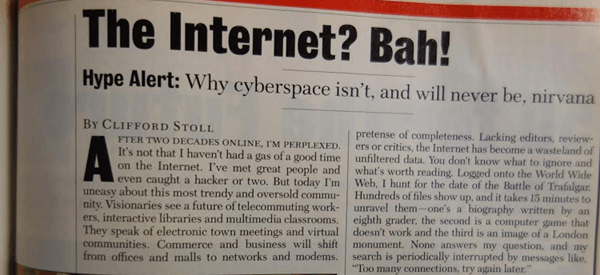In 1995 an article was written for Newsweek in which a skeptical journalist derided the prophecies surrounding the future of the internet.
The idea of virtual communities, cyber business, online shopping, digital media and even dating were met with scorn by the author.
Everything he said wouldn’t happen, happened. On top of that, ChatGPT is here.
Admittedly, the internet was never designed for all the things we take for granted today. Like most innovations, it was originally developed after World War 2 for military applications.

Oh how wrong he was…
Opportunities that were previously off limits are now within the reach of those willing to become technology literate.
There was a most interesting interview with David Bowie on BBC’s Newsnight back in 2000 where he shares his observations on the huge changes he witnessed.
His prophecy on the internet has become scarily true. His exact words were, “We haven’t even seen the tip of the iceberg.”
Transactions and decision making for individuals is faster. Supply chains are accessible. Services can be found cheaper. Instant networking has given us the global village – plus a few global village idiots!
However, the author of the 1995 Newsweek internet article may have been onto something during his critique.
I was reading some recently published blogs about the internet the other day and bookmarked a post written about our increasingly non-linear digital paradigm being full of promises AND perils.
Access for All..?
I’m glad to say the age of the web has brought greater transparency, learning and accessibility. The low barrier of entry to technology, knowledge, resources not to mention a ready made audience for marketers is an undeniably attractive proposition.
This was just not possible in the last century.
Without a boss, shareholders or other naysayers, millions of independent free thinkers are exploring the possibilities in the connected world.
How New Legislation Affects Small Business
Net Neutrality and the future of the internet itself is a topic frequently in the spotlight especially with issues that include hacking, piracy and privacy.
As technology continues to dominate, more stories over data leaks break. Edward Snowden is a high profile media debacle. Look what happened to Sony. And think of the daily reports on cyber crime scams like email phishing and identity theft.
Will the world wide web become over regulated so that free enterprise is stifled? Or is the idea of stricter regulation a blessing?
All boats float on a rising tide, but what happens when those same waves experience a storm?
The European Union is a Problem
If you read the news you’ll know the EU regularly are at odds with Google and other American tech companies, forcing them to adopt new policies including computer cookie compliance.
Being based in the UK I can tell you the European Union have passed some laws that are not too popular with micro businesses.

Someone on LinkedIn said EU VAT almost ruined their business
GDPR was adopted in May 2018 regardless of Brexit, meaning the UK have to observe EU lawmaking without having a say in it. GDPR applies to any country wanting to sell to European citizens, but because of the level of compliance required for the EU VAT laws, some companies have chosen to geoblock EU residents to prevent them from buying goods and services in the first place.
Many of these laws were passed without taking into account that some businesses are tiny, and perhaps purely digital. They exist only because of the internet.
Many non-EU companies continue to sell their stuff to those inside the EU but turn a blind eye to the VAT thing because it is too difficult to uphold that level of bureaucracy.
Don’t Let the Web Cast it’s Shadow on You
Customers expect a 360 degrees view of your business. Having trust and attention are two major components to achieving success in any capacity today, and like many things, it has to be earned over time.
The honest businesses among us are always going to have a tough time because of the liars, crooks and other rotten eggs stinking up the web. My position has always been this: if you’re any good at what you do, prove it, and use the internet as the means to communicate the experience and expertise I assume you have.
Everyone’s A Marketer
A lesson worth taking away is this: If you don’t do your own internet marketing, a cowardly competitor *could* do it for you.
Even a disgruntled customer with a genuine gripe can end up damaging your brand by mentioning it to their friends or leaving unfavourable reviews that could have been avoided. I often see Google one star reviews that only got to the stage they did because the business was consistently failing in areas that it refused to address. A bad review is often a cry for help, like a squeaky wheel begging get oiled. But it’s too late.
We all have the power to influence a marketing narrative and the internet amplifies it either for your profit or to your peril.
Posts About The Internet
Privacy and Data Protection is a Matter of Life and Death
UK Businesses Electronically Processing Data Are Legally Required to Register with the ICO
Stolen Credit Card Email Scam Targets Small Businesses and Service Providers
Warning: Dubious Web Industry “Regulator” Selling Questionable Business Leads
Theresa May’s Snooper’s Charter Gives Unprecedented Legal Surveillance Power to Spooks
Vote “Remain” in the EU: Britain is a Steadying Hand on Digital Law Madness
Net Neutrality: Do We Need It?
Should You Expand Your Small Business Abroad?
Cookies, Privacy & Permission: Is Your Website Legal?
I Was A Google Search Engine “Rater”


Add Your Thoughts